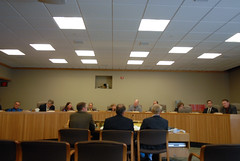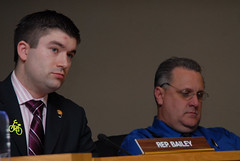As the clock ticks in Salem on the 2009 legislative session, the Bicycle Transportation Alliance (BTA) and other bike advocates are making last ditch efforts to make Oregon’s laws more friendly to bikes.
Today in Salem, work sessions (different from public hearings in that no testimony is heard) will be held for a bill that could increase funding for bike projects and a bill that would get tougher on people whose dangerous and/or illegal behavior results in the death of another person.
HB 2001 is the revamp of the Governor’s Jobs and Transportation Act of 2009. The BTA is working for two amendments they hope to stuff in the bill before it leaves the House Transportation Committee.
The first one is an amendment (originally outlined in HB 2120) that would increase the amount of Highway Fund dollars the state must spend on pedestrian and bicycle projects from the current 1% to 1.5%. (Just for some perspective, in 2008, ODOT spent $6,283,900 or 1.09% of the Highway Fund on bike/ped infrastructure.)
At this point, there doesn’t seem to be strong momentum for this amendment. Last Thursday, House Transportation Committee member Jules Bailey told Sarah Mirk of the Portland Mercury that “There is a sentiment in the building that now is not the time for investing in bicycle and pedestrian infrastructure.” Bailey said there’s a perception among legislators that cyclists are viewed as nothing more than a “priveleged class” and that during hard economic times, when construction jobs are coveted, “the idea is we need big road projects.” (Read more from Bailey on the Mercury Blog)
Speaking to BTA lobbyist Doug Parrow this morning, he also doesn’t seem too hopeful that the 1.5% will come to pass. Parrow said that there’s even been a proposal floated in the state capitol to eliminate the existing 1% entirely.
Parrow said one point they’ve tried to make to legislators recently is that about 2/3 of the 1% dollars currently go toward pedestrian facilities. “That was important,” Parrow said, “because so many of our conversations are about how bikers don’t pay, so we don’t deserve highway dollars.”
The second thing advocates hope to stuff into HB 2001 is a pot of money for non-motorized transportation (formerly encapsulated in HB 2902/SB 635) that is not on the public right-of-way (like off-highway paths, trails, boardwalks, greenways, etc…). Advocates are eyeing the renewal of the ConnectOregon program that uses State Lottery dollars invest in transportation infrastructure.
The only problem is that currently “non-motorized transportation” is not even listed as being eligible for those funds. Here’s the exact wording of the proposed amendment as it now stands:
“SECTION 8. (1) The Legislative Assembly finds that issuing lotter bonds to finance transportation projects is essential to promoting the state’s economic development.
(2) The use of lottery bond proceeds is authorized based on the following findings:
…
(b) A safe, efficient and reliable transportation network supports the long-term economic development and livability of this state. A multimodal network of air, rail, public transit, highway and marine transportation moves people and goods efficiently.”
You’ll notice that non-motorized modes are not mentioned in that important list. At hearings for the bill last week, I watched Portlanders AJ Zelada (a member of the Oregon Bicycle and Pedestrian Advisory Committee) and Alison Graves (communications director at the Community Cycling Center) both testify in front of the committee that the words, “non-motorized vehicles” should be added to the list.
The other important bill having a work session today is HB 3377, the Vehicular Homicide bill (it will be in front of the House Judiciary Committee). According to lawyer and BTA legislative committee member Ray Thomas, they just received some important amendments to the bill that he feels greatly increase its chances to pass out of committee.
Here is the latest definition of the bill:
Negligently Operating a motor vehicle or boat that causes the death of another if:
Causing the death of another human being by the negligent operation or handling of a vehicle
(a) The operator does not have an appropriate grant of driving privileges, or
(b) The operator is driving without insurance, or
(c) The operator’s ability to safely operate the motor vehicle is impaired (defined).
“Negligently means failing to be aware of a risk that death will occur. The risk must be of such a nature and degree that the failure to be aware of it constitutes a deviation from the standard of care that a reasonable person would observe in the situation.”
Thomas says he feels the bill is ready for prime-time, but even if it passes out of committee, it’s chances of reaching a full vote on the House floor remain daunting. That’s because the bill would ultimately imprison more Oregonians and therefore it has a fiscal component. After committee, it will be referred to Ways and Means, which BTA executive director Scott Bricker referred to last week as “the graveyard for most bills.”
Tomorrow is the last day for work sessions.
— For more on the Governor’s Jobs and Transportation Act of 2009, read our in-depth report by Libby Tucker. Stay tuned for more updates on these bills. Browse the rest of our 2009 Legislative Session coverage.



